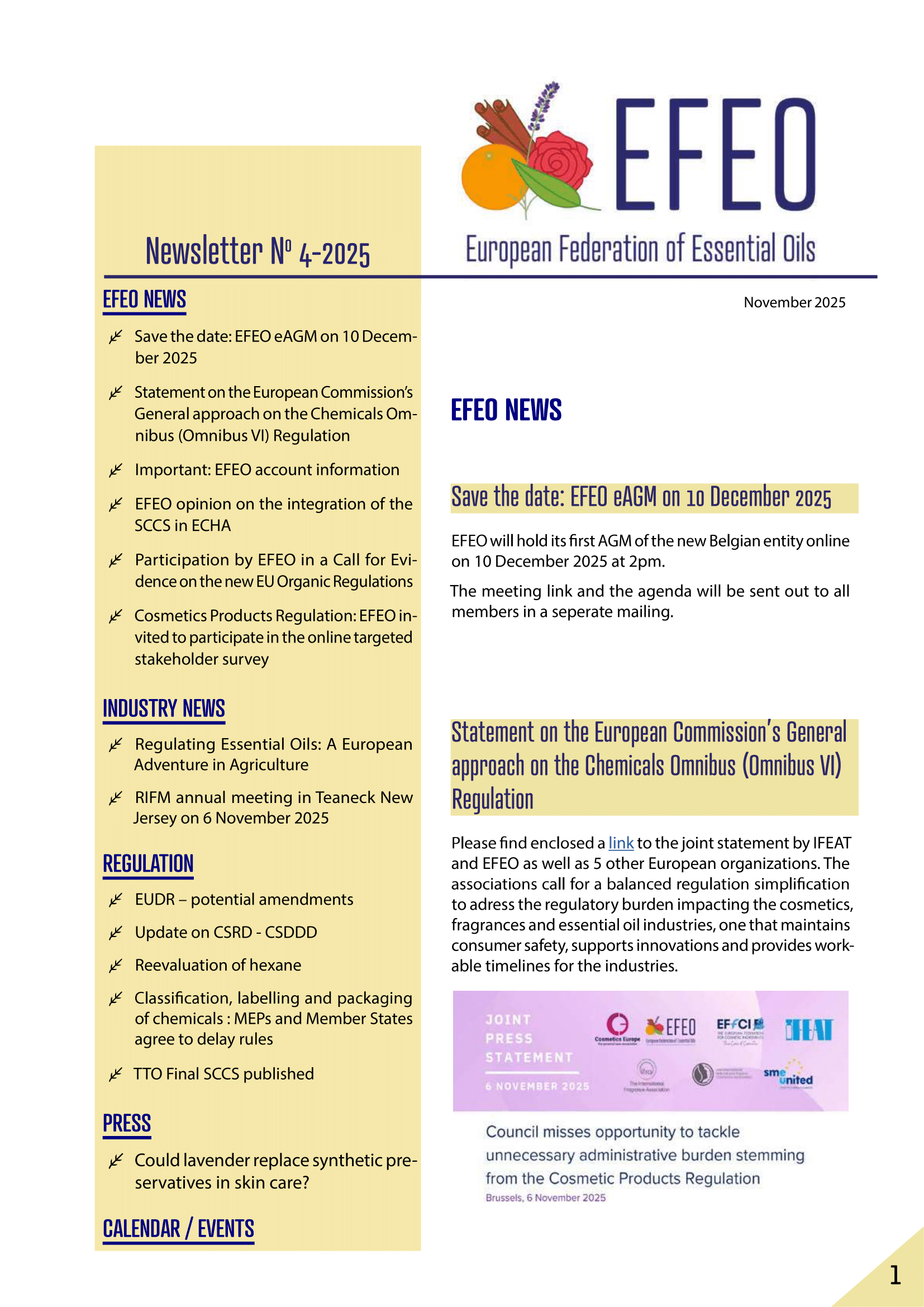The following Internal Rules on the eligibility of members, responsibilities and procedures as well as other issues have been adopted by the Board in accordance with Art.VI b 4th paragraph of EFEO´s Statutes and adopted by the Annual General Assembly held in Grasse on 30th May, 2024. They are superseding the former By-laws/Internal Rules last amended in 2017.
1. Composition of the Board
- Only the following individuals from full (active) members in the meaning of Article III paragraph 1 a) and b) of EFEO´s Statutes qualify as members of the Board, and may be proposed by the Board for election by the General Assembly or may be appointed by the Board during the current year under Art. VI b of the Statutes:
- owners and leading employees of individual EFEO members
- delegates/representatives from EFEO´s member associations
- exceptionally: former Board members, not or no longer matching the criteria under a) or b), but whose particular knowledge and professional experience is deemed valuable (Honorary members).
In case of resignation from office or if the a.m. conditions of eligibility do not continue any longer the Board member loses his office with immediate effect. In the latter case or in case of actual need, the Board may appoint further members eligible under this paragraph.
Only members of the Board can be proposed for election as the President, Vice President and Treasurer. Board members must be ready and willing to assume responsibilities as the Vice President and President.
In order to document Board discussions, the President can, when appropriate, invite experts/consultants to participate without voting rights.
The Board is entitled to create temporary committees/working groups to deal with specific projects or initiatives and reporting to the EFEO Board.
- Further to paragraph (1) first sentence, also EFEO member associations and individual EFEO member companies are entitled to propose an individual for a seat on the Board. Name and function of the candidate shall be communicated to the Board via the EFEO Secretariat by means of a formal application letter, confirming that the proposed person
- meets the criteria laid down in paragraph (1) lit (a) or (b) above,
- fulfills all other obligations and requirements allocated to members of the Board under the present Internal Rules,
- particularly, will be capable and willing to regularly attend the meetings of the Board,
- will contribute to the work and will assume tasks and responsibilities as decided by the Board.
The Board shall decide on the basis of the application letter, under due consideration of the actual need of a completion of the Board. In case of a positive decision, the Board will proceed as outlined above in paragraph (1), first sentence.
2. Conduct of Board members
Board members are committed to participate in Board meetings which have been agreed upon and fixed in due time in advance. In case of repeated non-appearance (three consecutive meetings) the member shall be excluded from the Board. Before taking a decision, the Board shall adequately consider temporary extraordinary circumstances reflected in a formal explanation received from the Board member concerned.
3. Decision and Communication Procedures
The Board decides by a simple majority of votes. The majority refers to the votes of those present; a quorum is only constituted if at least three quarters of the number of Board members are present.
A Board member represented by proxy shall be regarded present. Adoption and any amendment of these By-laws require a three quarter majority decision of the whole Board, and are subjected to the approval of the General Assembly.
Any Board member as well as the Secretary is entitled and encouraged to forward a subject for discussion and decision in the Board. President and/or Secretary may set an adequate deadline and decide upon a matter on the basis of the votes received in time. In case a vote, comment or response on a proposal has not been received on time, the Board member is assumed to have abstained from voting. No member shall re-enter into a discussion once a final decision has been made unless justified by new facts.
Any discussion within the Board should be strictly limited to the topic under discussion. For all communication, only the official Board member mailing list, as updated by the Secretariat, shall be used. Board members shall restrain from involving third parties in regular internal communication.
4. Co-operation between Board and Secretariat
The Board is responsible to formulate the general aims and targets of the Association and shall discuss and decide upon matters of a more general nature and /or of political concern. On decision of the Board, a specific matter (project, organization of a particular event, any other issue as decided by the Board), may be delegated to one or more Board members taking care of this matter completely and in their own responsibility. Results and recommendations as well as proposals for decisions shall be presented to the Board for approval.
The Secretary General is only bound to the decisions of the Board as such and to individual instructions issued by the President acting as a spokesperson for the Board. The Board shall abstain from involvement in matters of day-to-day business allocated to the Secretariat unless the nature of the case requires such an involvement by the President, acting as a spokesperson of the Board.
The Secretary General and the Secretariat implement decisions of the General Assembly as well as decisions of the Board in their own responsibility. Any day-to-day business, including the regular member information or guidance to the individual members, and including all matters of organization of e.g. meetings /events unless specifically allocated to a Board member, are in the Secretariat´s responsibility.
5. Executive Committee
Under the chairmanship of the President, an “Executive committee” shall be established, acting as a steering committee, to implement matters quickly, and to propose and bring forward issues in an effective way. Competencies of the Executive committee are:
- to identify and propose candidates for election, re-election, or appointment as Board members and for the office of President/Vice President/Treasurer
- to identify and propose issues for the treatment and decision by the Board.
- to implement issues and projects decided by the Board or by the General Assembly
- to identify issues to be delegated to the chairperson of a committee.
- to propose matters concerning the EFEO policy for discussion and decision in the Board.
The Executive committee shall include – but is not limited to- President, Vice President, Immediate Past President, Treasurer and the heads of the Committees. The Secretary General is invited as an observer.
6. Technical Committee (TC)
The Technical Committee is established as a permanent Committee on the basis of Article VI b (2) of EFEO´s Statutes and is charged with all technical matters including legislation developments with relevance to technical and scientific matters, as well as representing EFEO in meetings with technical bodies of other associations and at relevant authorities.
The Technical Committee will be chaired by one or more member(s) of the Board in the meaning of paragraph 1(1) above and reporting directly to the Board.
The Technical Committee will be provided organizational and functional support from staff and experts of EFEO´s Secretariat if and to the extent deemed necessary.
The Technical Committee is open for participants from full (active) members in the meaning of Article III paragraph 1, a) and b) of EFEO´s Statutes.
7. Communication Committee
The Communication Committee is established as a permanent Committee on the basis of Article VI b (2) of EFEO´s Statutes. This Committee takes care of EFEO´s public relations work and is responsible for EFEO´s communication with the members as well as the communication with third parties.
The Committee shall regularly consist of at least three Board members determined by decision of the Board. The Committee is chaired by one of them. The chair is reporting regularly to the Board.
The Committee is supported by the Secretariat and may be enforced by voluntary experts from member companies and member associations, after admission by the Committee.
The Committee acts in accordance with the general and specific policies decided by the Board.
8. Public Affairs Committee
The Public Affairs Committee (PAC) is established as a permanent Committee on the basis of Article VI b (2) of EFEO´s Statutes and particularly serves the purpose to
- identify legal and other developments that require activities from the Board.
- prepare and propose to the Board lobbying and any other activities in defence of the interest of essential oils and
- to prepare and coordinate such activities with other associations, interest groups and stakeholders.
The Committee shall consist of:
a) President, Vice President, Immediate Past President and Board members determined by the Board, as well as persons from individual EFEO member companies and member associations, upon request after decision of the Board,
b) on invitation of the Board, experts in regulatory and advocacy matters as well as EFEO´s Secretary General.
The Committee shall regularly consist of at least three Board members determined by decision of the Board. The Committee is chaired by one of them. The chair is reporting regularly to the Board.
9. Functions of financial manager and treasurer
- The Secretary General acting as EFEO´s financial manager is responsible for the day-to-day financial transactions, for the preparation of the income and expenditure account for the lapsed financial year, and for the quarterly financial overview reflecting the current financial status in relation to the current budget. He will provide the treasurer with all necessary information relating to the items outlined below (2).
- EFEO´s treasurer, who is a member of the Board, will review the accounts and the overview mentioned above under (1) before presenting the figures to the Board for approval. Further on, in close co-operation with the financial manager, he will set up the budget for the subsequent financial year and present it to the Board for approval and to the AGM for final decision.
10. Application of competition rules
All individuals who have a function described in these Internal Rules are aware of their duty to refrain from any anti-competitive behaviour. Both in meetings and in any kind of written or verbal communication, members of the Board, the Committees and the Secretariat are obliged to object against any subject of discussion or decision relevant in terms of competition law. Chairpersons of meetings have an increased responsibility to identify and prevent any subject of discussion or decision which might conflict with competition rules.




